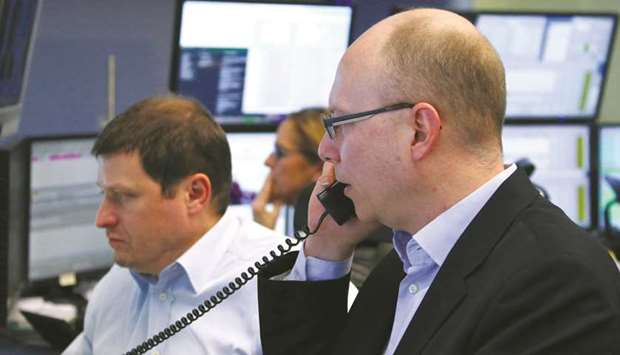Spreadex analyst Connor Campbell said that “the latest twist in the US-China tariffs tiff last Friday continued to define trading”.
Frankfurt underperformed EU peers “with political tensions in Germany rising over an argument about migration”, noted Campbell.
The euro stabilised versus the dollar after falling to 11-month lows on Friday.
Tokyo earlier closed down almost 1%, while Shanghai and Hong Kong were closed.
Fresh fears of a trade war between the world’s top two economies have emerged after the United States and China imposed tit-for-tat tariffs on billions of dollars of imports.
Weakness in stock markets came “amid festering global trade concerns after the US and China traded tariff announcements last week,” said analysts at the Charles Schwab brokerage.
US President Donald Trump’s decision last week to hit China with 25% levies was met with an immediate retaliation, moving the two closer to a trade war that could potentially batter the global economy.
The announcement came despite weeks of talks between the two sides.
The developments had already sent stocks into the red across Europe and on Wall Street Friday, and the weaker trend continued on both sides of the Atlantic yesterday.
London’s FTSE 100 was flat at 7,631.33 points, Frankfurt’s DAX 30 lost 1.4% at 12,834.11 and Paris’s CAC 40 was down 0.9% to 5,450.48 points at close yesterday.
In Europe, investors were also looking ahead today, when French President Emmanuel Macron heads to Germany for talks with Chancellor Angela Merkel.
Merkel and Macron both agree on the need for a Europe-wide response to migrants, and are hoping to hammer out a policy acceptable to all member states that would ease the burden on Italy, Greece and other main entry points.
Hardliners in Merkel’s conservative bloc meanwhile gave her a two-week ultimatum to tighten asylum rules or risk pitching Germany into a political crisis.
With traders fleeing to safer assets, the yen rose against the dollar.
Brent crude meanwhile rebounded after slumping last week, as investors fret over Russia and Saudi Arabia’s expected agreement to ramp up output at an Opec meeting that starts on Friday.
The two major producers have kept a ceiling in place since late 2016, which has helped ease a supply glut and lift prices from multi-year lows.
Benjamin Lu, a commodities analyst at Phillip Futures Singapore, said crude may soon be weighed down by trade war fears.
“We expect for global trade tensions to weigh on prices sporadically as populist sentiments pervade the financial markets,” he noted.
“Enhanced volatility can be expected... as markets worry about the prospect of weaker trade activity, with economic battle lines being drawn.”



